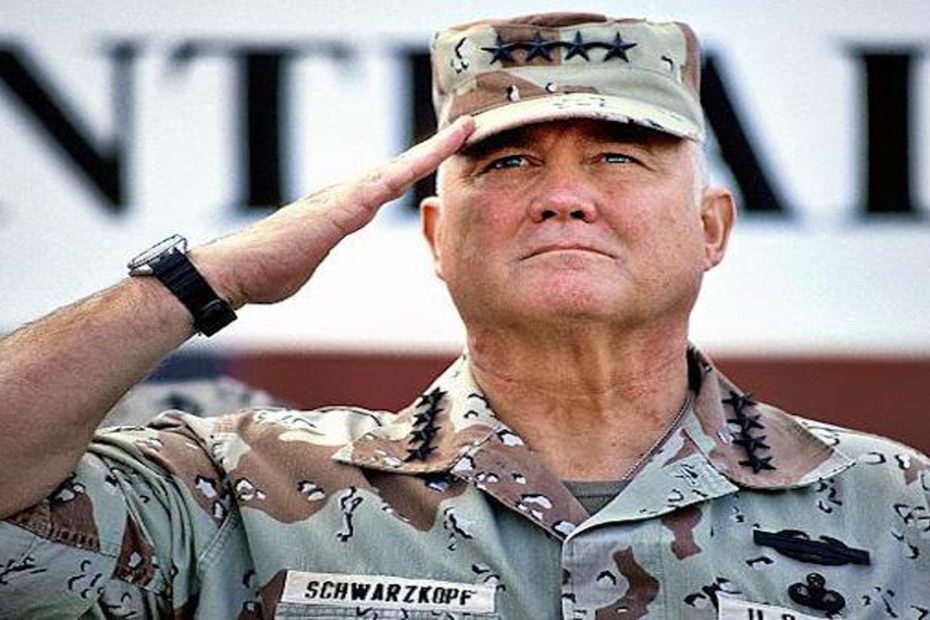Who Was General Norman Schwarzkopf..?
General H. Norman Schwarzkopf, affectionately known as “Stormin’ Norman,” was one of the most iconic military figures of the late 20th century. He rose to global prominence during Operation Desert Storm, leading a coalition of forces to liberate Kuwait from Iraqi occupation in 1991. But Schwarzkopf’s legacy goes far beyond the battlefield. He was admired for his leadership style, bravery, and deep sense of responsibility toward the men and women under his command.
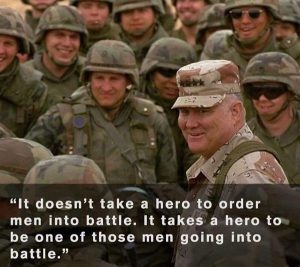
Early Life and Military Family Background
Born on August 22, 1934, in Trenton, New Jersey, Schwarzkopf came from a military family. His father, Herbert Norman Schwarzkopf, was a U.S. Army officer and the founding superintendent of the New Jersey State Police. Growing up in this environment, young Norman was instilled with a deep respect for discipline, Leadership, and service to the nation. His father’s career, which included work in the military and law enforcement, set the foundation for Norman’s path.
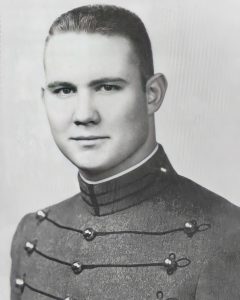
Schwarzkopf’s Education and Early Military Career
Schwarzkopf was admitted into the United States Military Academy at West Point following his attendance at the esteemed Valley Forge Military Academy; he graduated in 1956. This launched his long and illustrious military career. Following graduation, he served in the U.S. Army, developing his abilities and climbing the ranks. Early events as an army officer helped to define his leadership style and dedication to the troops he oversaw.
The Vietnam War: A Defining Experience
The Vietnam War was one of the most formative periods in Schwarzkopf’s career. Serving two tours in Vietnam, he quickly earned a reputation for being a brave and capable leader. Schwarzkopf was known for leading his troops from the front, often putting himself in dangerous situations to ensure their safety. It was during this time that he learned the true meaning of sacrifice and Leadership, developing his famous philosophy: It doesn’t take a hero to order men into battle. It takes a hero to be one of those men going into battle.
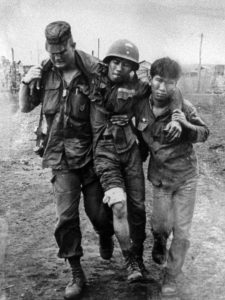
Rising Through the Ranks: From Colonel to General
Schwarzkopf kept rising in the U.S. Army following Vietnam, assuming increasingly important leadership responsibilities. He rose to be a four-star general in 1988 after holding important roles including supervising NATO’s activities. His quick ascent through the ranks was evidence of his strategic thinking, commitment to service, and great esteem among colleagues and subordinates.
Operation Desert Storm: Schwarzkopf’s Moment of Glory
In 1990, Iraqi forces, led by Saddam Hussein, invaded Kuwait, sparking an international crisis. Schwarzkopf was appointed commander of the coalition forces tasked with liberating Kuwait. Operation Desert Storm, launched in early 1991, was a military success. Schwarzkopf’s brilliant tactical planning and execution led to a swift victory with minimal coalition casualties. His decisive Leadership during the Gulf War cemented his reputation as one of the most outstanding military leaders of his generation.
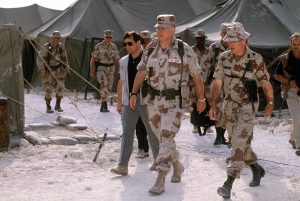
The Coalition Forces: A Diplomatic and Strategic Victory
One of Schwarzkopf’s most significant achievements during the Gulf War was his ability to lead a coalition of over 30 nations. Managing such a diverse group required not only military strategy but also diplomatic skills. He worked closely with political leaders worldwide to ensure the coalition remained united in its objectives. This aspect of his Leadership demonstrated his ability to adapt and succeed in complex international environments.
Leadership Philosophy: The Role of the Soldier-Leader
Schwarzkopf’s leadership style was rooted in the idea that a leader must be willing to endure the same hardships as the soldiers they command. He believed that to order men into battle, a leader must first be willing to go into battle themselves. His famous quote, “It doesn’t take a hero to order men into battle. It takes a hero to be one of those men going into battle,” perfectly encapsulates his philosophy. This mindset made him a beloved figure among his troops, who knew he would always stand beside them.
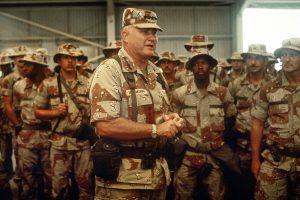
Essential Leadership Qualities: What Made Schwarzkopf a Hero…?
Schwarzkopf was a great leader for several fundamental reasons. His bravery first and most importantly. Even in cases involving great risk, he was never hesitant to make tough decisions. He also possessed an unquestionable moral sense, constantly putting his purpose and the welfare of his troops above his own. Often going out of his way to grasp the worries of the men and women under Schwarzkopf’s direction, Schwarzkopf was renowned for his sensitivity. Finally, his focus on detail and discipline guaranteed exact execution of every task.
Schwarzkopf’s Post-Military Life
After retiring from the military in 1991, Schwarzkopf remained active in public life. He became involved in various charitable causes, particularly those supporting veterans and military families. He also authored a memoir, It Doesn’t Take a Hero, reflecting on his military career and the lessons he learned. Even in retirement, Schwarzkopf continued to inspire others through his Leadership and dedication to service.
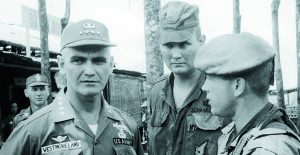
The Legacy of Operation Desert Storm
The success of Operation Desert Storm had a lasting impact on U.S. military strategy. It demonstrated the effectiveness of coalition warfare and the importance of technological superiority on the modern battlefield. Schwarzkopf’s Leadership during the Gulf War is still studied by military professionals today, and his approach to leading troops remains a model for future generations of officers.
Quotes by General Schwarzkopf: Words of Wisdom
Schwarzkopf’s words have inspired millions around the world. Some of his most famous quotes include:
– “Leadership is a potent combination of strategy and character. But if you must be without one, be without strategy.”
– “The truth is that you always know the right thing to do. The hard part is doing it.”
– “It doesn’t take a hero to order men into battle. It takes a hero to be one of those men going into battle.”
A Leader’s Impact on the Soldiers
Schwarzkopf’s Leadership deeply resonated with the soldiers under his command. They knew he genuinely cared about their well-being and would never ask them to do something he wasn’t willing to do himself. His empathy and willingness to lead from the front created a strong bond of loyalty and respect that lasted throughout his career.
General Norman Schwarzkopf in Popular Culture
Appearing in films, documentaries, and interviews, Schwarzkopf became into a cultural icon in the 1990s The American public loved him for his larger-than-life attitude and allegiance to his nation. His legacy lives not only in the military sphere but also in popular culture, where his name is connected with leadership and bravery.
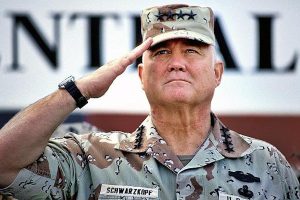
The Enduring Lessons from General Schwarzkopf
General Norman Schwarzkopf’s life is a testament to the power of solid Leadership, courage, and integrity. His ability to inspire loyalty, make tough decisions, and lead from the front made him one of the most respected military leaders in modern history. The lessons from his life and career are timeless, offering valuable insights for both military and civilian leaders alike.
FAQs:
1. What was General Norman Schwarzkopf known for…?
General Schwarzkopf was best known for leading coalition forces during Operation Desert Storm in the Gulf War in 1991.
2. What leadership qualities did General Schwarzkopf exhibit?
He was courageous, empathetic, disciplined, and maintained a high level of integrity throughout his career.
3. Why is the quote “It doesn’t take a hero to order men into battle” famous?
This quotation captures Schwarzkopf’s conviction in setting an example and his great respect for the men and women he commanded.
4. What did General Schwarzkopf do after retiring from the military?
He became involved in various charitable causes, particularly those supporting veterans, and wrote a memoir titled It Doesn’t Take a Hero.
5. How did Operation Desert Storm impact U.S. military strategy?
The operation’s success emphasized the importance of coalition warfare and technological superiority in modern military strategy

